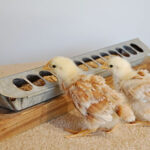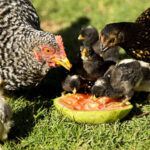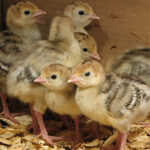
Before you get your chickens ready for the fair, a good idea is to attend a few shows and become familiar with the procedures. Once you have an idea how things are handled, you’ll be better prepared to get involved. And by making friends with people who regularly exhibit, you’ll be more relaxed and have […]
Continue Reading

One of a chick’s first instincts is to peck. As soon as chicks are in a brooder, they look for things to peck. On newspaper they will peck the print. If they don’t see anything else to peck, they’ll peck their own toes. Suitable feeders for baby chicks will help them find the starter ration […]
Continue Reading

Customers who contact Cackle Hatchery® frequently ask questions about feeding their flocks. Below are 17 of the most common questions our team is asked regarding feeding chickens. What do chickens eat? What chickens eat depends on their stage of growth. Confined chickens eat commercially formulated chick starter when they’re young and commercial layer ration when […]
Continue Reading

More than chicks, turkey poults (baby turkeys) can be tricky to brood. Even though they’re bigger than chicks, they’re much more delicate. They are extremely sensitive to temperature changes, dampness, and drafts. And they have a lesser instinct for danger. “Let’s face it,” says Jeff Smith of Cackle Hatchery®, “turkey poults are not the brightest.” […]
Continue Reading
 Buff Laced Brahma Chickens Sold As Baby Chicks Only
Minimums – Not Sexed = 3
Female = 3
Male = 1
Total of 3 birds to ship
Buff Laced Brahma Chickens Sold As Baby Chicks Only
Minimums – Not Sexed = 3
Female = 3
Male = 1
Total of 3 birds to ship
Seasonal/Shipped Early Feb thru September
Coming 2026
Continue Reading

Partridge Brahma Chicken Sold As Baby Chicks Only
Minimums – Not Sexed = 3
Female = 3
Male = 1
Total of 3 birds to ship
Coming 2026
Continue Reading

- Lavender Brahma – Sold as Baby Chicks Only
Minimums –
Not Sexed = 3
Female = 3
Male = 1
Total of 3 birds to ship
Seasonal/Shipped Feb thru September
COMING FOR THE 2026 SEASON
Continue Reading

- Paint Silkie Bantam – Sold as Baby Chicks Only – No Sexing Available
Seasonal/Shipped Early Feb thru Mid August.
Limit of 5
Continue Reading
Enjoy your free downloadable gift for updating your dealer listing with us here at Cackle Hatchery! Click Here to Download As an added bonus after downloading feel free to print any Cackle Hatchery sales sheets for poultry you may need instore: PRINTABLE CHICK SALES SHEETS Tips for printing: Make sure your printer settings are set […]
Continue Reading





 Buff Laced Brahma Chickens Sold As Baby Chicks Only
Buff Laced Brahma Chickens Sold As Baby Chicks Only
